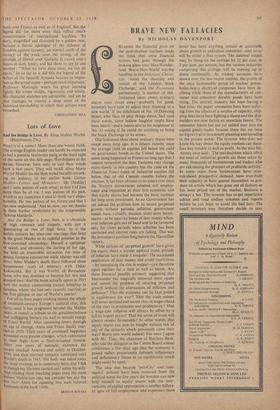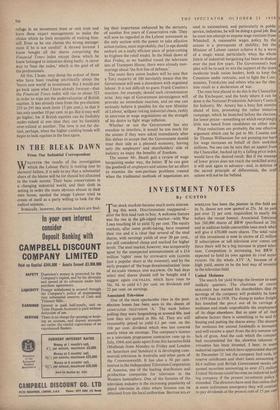BRAVE NEW FALLACIES
By NICHOLAS DAVENPORT Old-fashioned ideas about ordinary shares were swept away long ago. It is fifteen months since the average yield on equities fell below the yield on government bonds in the United States. The same thing happened in France so long ago that I cannot remember the date. Fashions may change more slowly in this country but the yield on the Financial Times index of industrial equities fell below that of old Consols months before the election. It has been obvious to investors ever since the Western democracies adopted full employ- ment and expansion as their first economic aim that equity shares had become the basic medium for long-term investment. As no Government has yet solved the problem how to secure perpetual growth without periodic inflation, government bonds have virtually become short-term invest- ments—to be upset by bouts of dear money when- ever inflation gets out of hand and to be favoured only for short periods when inflation has been corrected and interest rates are falling. This was the investment position long before the Macmillan victory.
While policies of 'perpetual growth' have given the equity share a secular upward trend, periods of inflation have made it irregular. The occasional application of dear money and credit restrictions —by restraining the rise in output—can therefore upset equities for a time as well as bonds. Are these financial pundits seriously suggesting that Macwonder has magically removed these upsets and solved the problem of securing perpetual growth without the alternations of inflation and deflation? That the economy can be kept poised in equilibrium for ever? That the trade unions will never demand and secure rises in wages ahead of the rises in production and productivity? That a wage-cost inflation will always be offset by ,a fall in import prices? That the terms of trade will always remain favourable? In other words, ,that equity shares can now be bought without risk of any of the setbacks which previously came their way? Brave new world indeed! For once I agree with Mr. Tuke, the chairman of Barclays Bank, who told the delegates at the Cotton Board annual conference a few days ago that the economy is poised rather precariously between inflationary and deflationary forces in an equilibrium which might easily be upset.
The idea that because `anti,City' and 'anti- capital' policies have been removed from the political scene for five years the investor can now help himself to equity shares with the near- certainty of capital appreciation is another fallacy. In spite of full employment and expansion there never has been anything certain or automafir, about growth in individual industries—and never will be under a free system. The national output may be rising on the average by 2f per cent. it 3 per cent. per annum, but the various industries comprising this average will be moving up or down continually. As trading accounts have shown over the last twelve months, the profits of the once fashionable group of nuclear power- boiler-heavy electrical companies have been de- clining while those of the manufacturers of con- sumer and consumer durable goods have beep rising. The aircraft industry has been having el bad time; the paper companies have been suffer-. ing from the effects of a surplus of capacity; ship- ping lines have been lighting a slump and the ship- builders are now facing an uncertain future. The consumer boom has not yet spilled over into the., capital goods trades because there has yet bees no big revival in investment planning and spending in the private sector. The investor who does not know his way about the equity markets can there- fore buy trouble as well as profit. As the wise Mr. Amory once said: The real decisions which affect the total of industrial growth are those taken by many thousands of businessmen and traders when are calculating the prospect of profitable activity:' In some cases these businessmen have over- calculated prospective demand, have over-built their capacity or have geared themselves to pro- duce an article which has gone out of fashion or has been priced out of the market. Business it; always a bet. The investor has to get superlative advice and read endless columns and report before he can hope to avoid the bad bets. The small investors may therefore decide to take refuge in an investment trust or unit trust and leave these expert managements to make the choice which he feels incapable of making him- self. Even so he can choose the wrong manage- ment if he is not careful! A shrewd investor I know bought all the shares comprising the Financial Tunes index except those which he knew belonged to industries doing badly. A clever $vay to 'beat the index,' which is the goal of all the professionals.
All this, I hope, may damp the ardour of those who have been reading uncritically about the 'brave new world' in investment. But I would not go back upon what I have already forecast—that the Financial Times index will rise to about 323 in order to wipe out the undervaluation of British equities. It has already risen from the pre-election 255 to 295 this week (over 15 per cent.), so that it has only another 10 per cent. to go. But it may well go higher, for if British equities can be foolishly under-valued at one time they can be foolishly over-valued at another. The time is not far dis- tant, perhaps, when the higher-yielding bonds will begin to look equities in the face again.







































 Previous page
Previous page